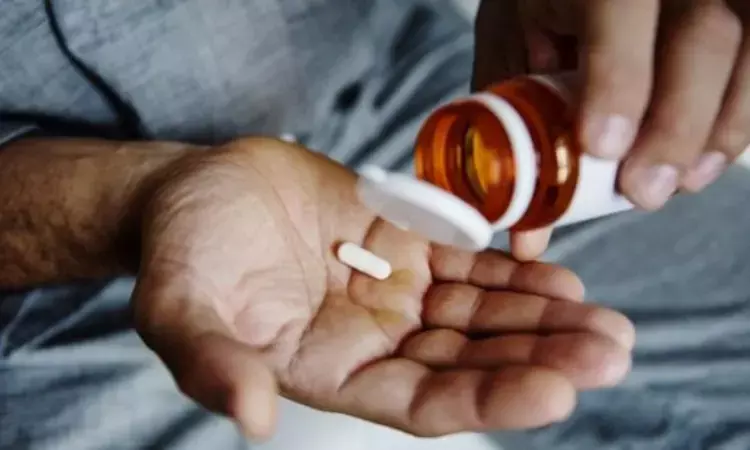- Home
- Medical news & Guidelines
- Anesthesiology
- Cardiology and CTVS
- Critical Care
- Dentistry
- Dermatology
- Diabetes and Endocrinology
- ENT
- Gastroenterology
- Medicine
- Nephrology
- Neurology
- Obstretics-Gynaecology
- Oncology
- Ophthalmology
- Orthopaedics
- Pediatrics-Neonatology
- Psychiatry
- Pulmonology
- Radiology
- Surgery
- Urology
- Laboratory Medicine
- Diet
- Nursing
- Paramedical
- Physiotherapy
- Health news
- Fact Check
- Bone Health Fact Check
- Brain Health Fact Check
- Cancer Related Fact Check
- Child Care Fact Check
- Dental and oral health fact check
- Diabetes and metabolic health fact check
- Diet and Nutrition Fact Check
- Eye and ENT Care Fact Check
- Fitness fact check
- Gut health fact check
- Heart health fact check
- Kidney health fact check
- Medical education fact check
- Men's health fact check
- Respiratory fact check
- Skin and hair care fact check
- Vaccine and Immunization fact check
- Women's health fact check
- AYUSH
- State News
- Andaman and Nicobar Islands
- Andhra Pradesh
- Arunachal Pradesh
- Assam
- Bihar
- Chandigarh
- Chattisgarh
- Dadra and Nagar Haveli
- Daman and Diu
- Delhi
- Goa
- Gujarat
- Haryana
- Himachal Pradesh
- Jammu & Kashmir
- Jharkhand
- Karnataka
- Kerala
- Ladakh
- Lakshadweep
- Madhya Pradesh
- Maharashtra
- Manipur
- Meghalaya
- Mizoram
- Nagaland
- Odisha
- Puducherry
- Punjab
- Rajasthan
- Sikkim
- Tamil Nadu
- Telangana
- Tripura
- Uttar Pradesh
- Uttrakhand
- West Bengal
- Medical Education
- Industry
Sacubitril/valsartan fails to improve cardiovascular biomarkers for people with recent COVID-19 infections: PARACOR-19 trial

USA: In a significant development in the fight against COVID-19, the PARACOR-19 randomized clinical trial (RCT) results shed light on the potential cardiovascular benefits of Sacubitril/Valsartan among patients recovering from recent COVID-19 infection. This groundbreaking study, conducted by a team of medical experts from prestigious institutions, offers new insights into managing cardiovascular complications in individuals post-COVID-19.
The pilot RCT of patients who recovered from acute COVID-19 showed that sacubitril/valsartan did not improve cardiovascular biomarkers. Exploratory analyses suggested the potential benefits of sacubitril/valsartan on cardiac wall stress and collagen turnover as measured by NT-proBNP and C-terminal telopeptide of collagen type I (CITP). Sacubitril/valsartan was well tolerated.
The findings of the PARACOR-19, a single-center, double-blind RCT, were published online in the European Journal of Heart Failure on May 11, 2024.
The PARACOR-19 was designed by Stephen J. Greene, Duke Clinical Research Institute, Durham, NC, USA, and colleagues to examine the effects of sacubitril/valsartan on markers of cardiac injury, function, inflammation, and structure among patients who have recovered from acute coronavirus disease 2019 (COVID-19) infection.
The trial included patients with cardiovascular risk factors and a history of COVID-19 infection 4–16 weeks before enrolment. They were randomized to sacubitril/valsartan (titrated to the maximum dose of 97/103 mg twice daily) versus a matching placebo.
Co-primary endpoints were a change in high-sensitivity cardiac troponin T (hs-cTnT) and soluble ST2 (sST2) from baseline to 12 weeks. Exploratory endpoints included change in additional circulating biomarkers from baseline to 12 weeks.
Overall, 42 patients were randomized between 2021 and 2023 (n = 20 sacubitril/valsartan, n = 22 placebo). The median time from COVID-19 diagnosis to enrolment was 67 days. The median age was 67 years, 48% were females.
The study revealed the following findings:
- Compared with placebo, sacubitril/valsartan did not significantly impact the co-primary endpoints of change from baseline in hs-TnT and sST2.
- In exploratory analyses, sacubitril/valsartan led to a 46% greater reduction in N-terminal pro-B-type natriuretic peptide (NT-proBNP) and a 51% greater reduction in C-terminal telopeptide of collagen type I.
- Permanent drug discontinuation occurred in four patients in the sacubitril/valsartan group and three patients in the placebo group.
- There were no deaths, and one patient was hospitalized in each group.
In the pilot, RCT of patients who recovered from acute COVID-19, sacubitril/valsartan failed to lower hs-cTnT or sST2 compared with a placebo. Exploratory analyses indicate its potential benefits on cardiac wall stress and collagen turnover as measured by CITP and NT-proBNP. Sacubitril/valsartan was well tolerated.
Reference:
Greene, S. J., Chambers, R., Lerman, J. B., Harrington, J., Wendell, D. C., Kim, H. W., Green, C. L., Butler, J., & Felker, G. M. Sacubitril/valsartan and cardiovascular biomarkers among patients with recent COVID-19 infection: The PARACOR-19 randomized clinical trial. European Journal of Heart Failure. https://doi.org/10.1002/ejhf.3199
Dr Kamal Kant Kohli-MBBS, DTCD- a chest specialist with more than 30 years of practice and a flair for writing clinical articles, Dr Kamal Kant Kohli joined Medical Dialogues as a Chief Editor of Medical News. Besides writing articles, as an editor, he proofreads and verifies all the medical content published on Medical Dialogues including those coming from journals, studies,medical conferences,guidelines etc. Email: drkohli@medicaldialogues.in. Contact no. 011-43720751


